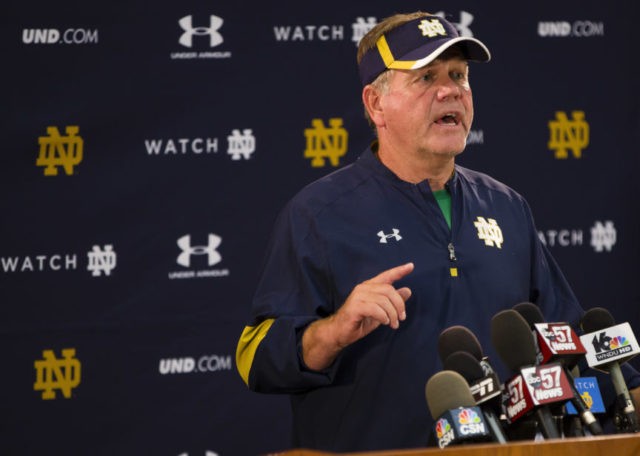The University of Notre Dame’s once-legendary football program suffered another major blow this week when the NCAA issued a searing “Public Infractions Decision” detailing violations of academic standards.
The stunning decision recommended the “vacation of team records,” which could mean that the program’s victories in 2012 and 2013 would be erased (in 2012, the team was 12-1, ending with a loss to Alabama in the national championship game; in 2013, its record was 9-4).
A female trainer was also put on probation for one year, and a $5,000 fine was levied.
“All parties agreed to the primary facts and violations” included in the document, which details four violations of NCAA bylaws:
(1) academic misconduct and unethical conduct by the former student athletic trainer and two football student-athletes;
(2) academic misconduct by a football student-athlete without the involvement of an institutional staff member;
(3) impermissible participation after the institution erroneously certified student-athletes as academically eligible; and
(4) impermissible academic extra benefits provided to six football student-athletes.
The NCAA document lists several “aggravating factors, including the Notre Dame program’s “history of Level I, Level II or major violations,” and “Multiple Level II violations.” The “mitigating factors” included “Prompt self-disclosure of the violation(s),” “Affirmative steps to expedite final resolution of the matter,” and “An established history of self-reporting Level III or secondary violations.”
When allegations of infractions of NCAA rules arise, it is common for the accused institutions vigorously to defend their actions, often causing negotiations to go on for years. A prominent case – in fact, probably the most heinous case of academic malpractice in NCAA history – is that of the University of North Carolina, where an academic scandal caused Chancellor Holden Thorp to quit in disgrace four years ago. There, over the course of eighteen years, an African American Studies program granted credit to thousands of students, athletes prominent among them, for classes that never even bothered to meet.
The NCAA has yet to take final action in that case.
As early as 2014, Notre Dame officials were aware of the violations. Nonetheless, last January 27, university athletic director Jack Swarbrick announced that he and head coach Brian Kelly had agreed to an extension of Kelly’s contract through the year 2021.
Kelly’s tenure at Notre Dame has suffered other setbacks. In 2010, a freshman committed suicide when university police did nothing after she reported being sexually assaulted by a member of the football squad (the player never missed a game). That same year, a student videographer was killed when the scissor lift he was using to film the team practice was toppled by gale-force winds (the university paid a fine for a health and safety violation). In 2012, starting quarterback Tommy Reese was arrested for assaulting a police officer, and in 2013, Reese’s successor Eric Golson was sidelined for the season for “using poor judgment” on an exam.
Most recently, last August, one week before the start of the new season, police arrested six Notre Dame football players in two separate incidents for criminal conduct including illegal possession of a loaded weapon, battery on a police officer, resisting law enforcement, and illegal drug possession.
Notre Dame’s reputation for academic excellence, first celebrated by long-time president Theodore Hesburgh, C.S.C., has often been blamed for the team’s inability to recruit the best talent. Kelly’s predecessor Charlie Weis complained bitterly about the tough academic demands made on prospective recruits. And Irish “Golden Boy” and 1956 Heisman Trophy winner Paul Hornung got in hot water when he told a radio show in 2004 that Notre Dame had to lower those standards: “You can’t play a schedule like that unless you have the black athlete today. You just can’t do it, and it’s very, very tough, still, to get into Notre Dame. They just don’t understand it, yet they want to win.” (A Notre Dame spokesman later condemned the comments).
This Saturday, Notre Dame closes out its season against Southern Cal. Given the team’s dismal record (4-7), this will be Kelly’s first year at Notre Dame without a bowl game. Undoubtedly he will be looking for some good news during the Christmas season.
And he might get some: on Tuesday, Notre Dame President Rev. John Jenkins, C.S.C., announced that the university will appeal the NCAA decision. “The NCAA has never before vacated the records of an institution that had no involvement in the underlying academic misconduct, and the membership has since voted to change the rule that brought this case within NCAA jurisdiction,” the statement read.
How long will it take?
Well, timing at the NCAA is hard to predict. In March 2015, when Indiana Governor Mike Pence signed the Religious Freedom Restoration Act (SB 101) into law, NCAA President Mark Emmert reacted within hours, darkly suggesting that the NCAA might remove its championship tournaments from the state. Meanwhile, athletic teams from the University of North Carolina continue to compete in games and tournaments even as the NCAA drags its feet into the fifth year regarding a final decision regarding the punishment the University might suffer as a result of its academic scandal.

COMMENTS
Please let us know if you're having issues with commenting.